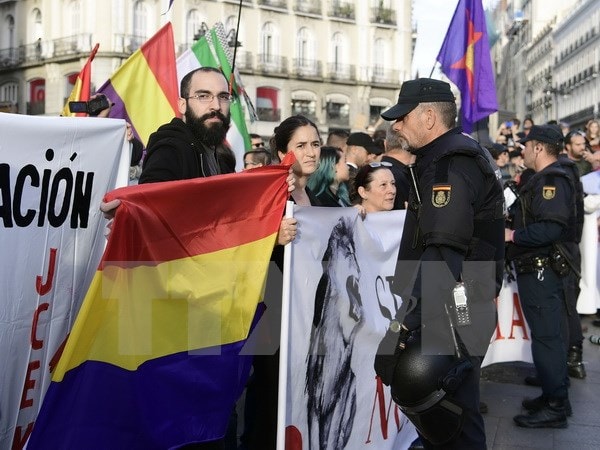Spanish Prime Minister Claims Catalans Were Deceived
According to a VNA correspondent in Southern Europe, Spanish Prime Minister Mariano Rajoy, in a televised speech on October 1, affirmed that the people of Catalonia had been deceived and that there was no vote on independence for the region on the same day.
 |
| Police block a crowd of people marching to call for a referendum on Catalan independence at Puerta del Sol square on October 1. (Source: AFP/VNA) |
According to Prime Minister Rajoy, most Catalans did not want to participate in the referendum that the regional government planned to hold. Mr. Rajoy also reiterated that Catalan leaders knew the vote was illegal, but they still went ahead.
Commenting on the latest reports of violent clashes between police and protesters during the vote, Mr. Rajoy expressed his gratitude to law enforcement agencies for doing their duty.
In his speech, Prime Minister Rajoy also called on the Catalan government to stop following a path that he said "leads nowhere." He also said he would call for a meeting of all political parties to consider the country's future.
Earlier, Prime Minister Rajoy called on Catalan leaders to cancel the referendum, while affirming that "there is still time" to avoid making the problem worse. Mr. Rajoy also urged Catalan politicians to obey the law, end all acts of civil disobedience and stop radical actions that escalate the situation.
Meanwhile, the Catalan health agency said the number of people injured in clashes with police had reached 761. According to previous figures, only about 460 people were injured. However, the Spanish government authorities have not yet released official information on the number of people injured in the clashes in Catalonia.
Polling stations in Catalonia closed on the evening of October 1 local time and regional officials said the vote counting process could take a long time and face many difficulties.
The Spanish Constitutional Court and central government have always maintained that the referendum in Catalonia is unconstitutional and contrary to the goals and ideals of the European Union (EU). The Spanish government is currently taking all measures to prevent the plot of some groups that want Catalonia to separate from the country.
The Spanish central government on October 1 continued to strengthen its crackdown on the actions of the Catalan regional government to prevent an illegal referendum demanding independence for the region.
Several clashes between radical protesters and police took place on October 1 - the day of the referendum as planned by the Catalan government. The regional health agency said more than 300 people were injured. Analysts said that, no matter what, the Spanish government is determined to prevent this illegal referendum and will never recognize the results of the vote.
From a legal perspective, this referendum is illegal, based on the following two points. First, the Spanish Constitution stipulates that only the central government has the authority to conduct such a referendum, while the regional government has no authority in this matter. Second, according to international law, more specifically European Union (EU) law, there is no provision to legally support a referendum like the one in Catalonia.
Vice President of the European Commission Frans Timmermans once emphasized that citizens of an EU member state must comply with the laws and constitution of that country, whether they like it or not, that is the rule of law principle. According to Mr. Timmermans, any action taking place in an EU member state must be constitutional.
The Spanish Constitutional Court and central government have always maintained that the referendum in Catalonia is unconstitutional and contrary to the goals and ideals of the EU. The Spanish government is currently taking all measures to prevent the plot of some groups that want to separate Catalonia. However, the situation is still complicated. Many sources predict that protests by groups that want to separate Catalonia will continue in the coming days.
Catalonia is a wealthy region in the northeast of Spain, with 7.5 million inhabitants, accounting for about 16% of the total population. The region contributes 19% of Spain's Gross Domestic Product (GDP), accounts for 25.6% of the country's total exports and attracts 20.7% of foreign investment.
The Catalonia issue, if not quelled, risks threatening the unity of Spain as well as the European Union.
In addition, because Spain is the fourth largest economy in the Eurozone, the instability in Catalonia will also affect the Spanish economy in particular and the Eurozone economy in general./.
According to VietNam +
| RELATED NEWS |
|---|

